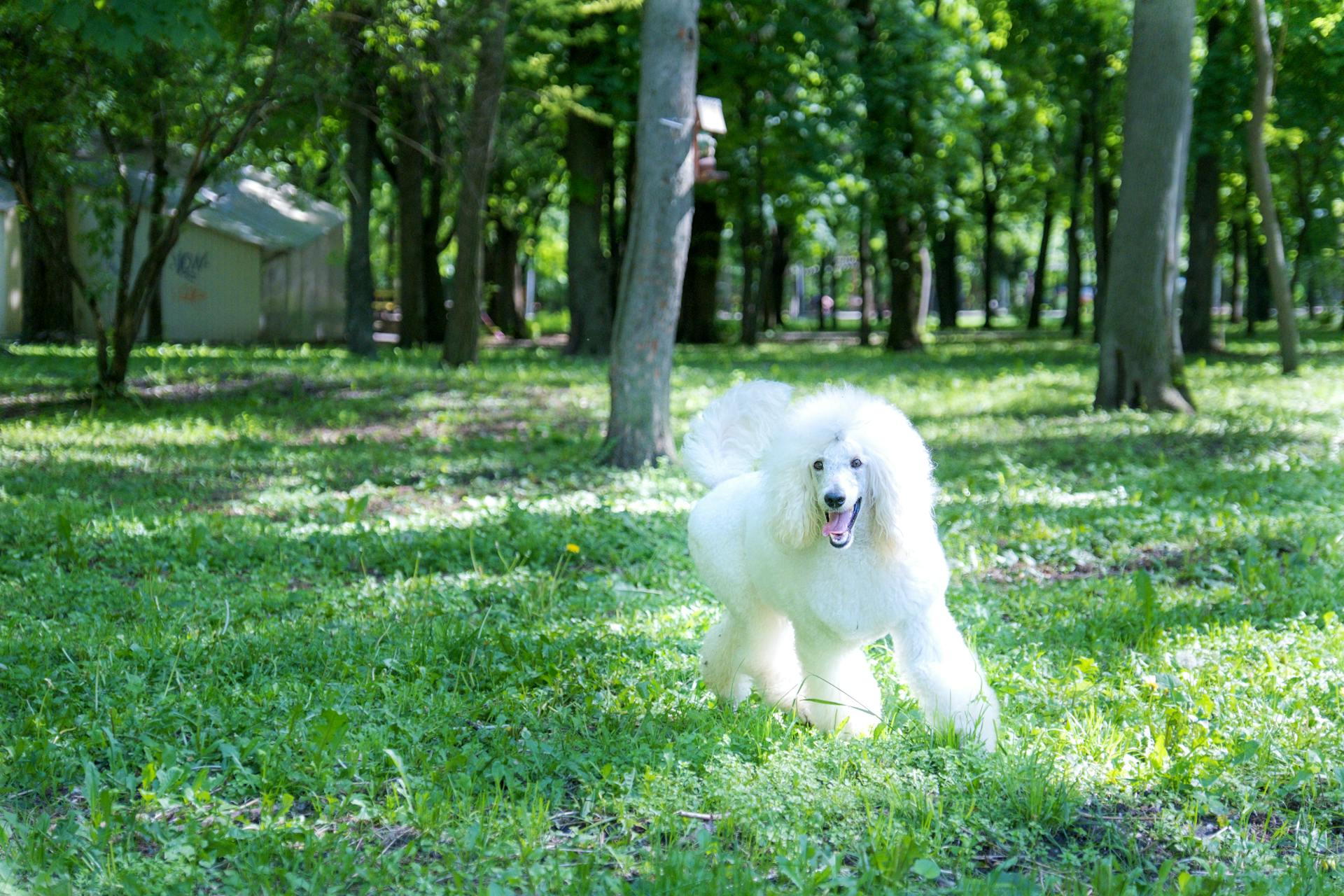
If your Shih Tzu is shaking, it's likely due to anxiety or stress, which can be triggered by loud noises, new environments, or separation from its owner.
Shih Tzus are prone to separation anxiety, which can cause shaking and other distressing behaviors.
Shaking can also be a sign of physical discomfort, such as arthritis or dental problems, which are common in older Shih Tzus.
In some cases, shaking may be caused by a medical issue like hypoglycemia or a neurological disorder, but this is less likely.
What Causes Shaking in Shih Tzus
Shaking in Shih Tzus can be caused by a variety of factors, ranging from physical health issues to emotional responses.
One possible cause of shaking in Shih Tzus is injury or trauma to the head. This can be due to an accident or a fall, and may be accompanied by other symptoms like limping or whining.
Certain medications can also cause shaking in Shih Tzus. If your dog is taking any medications, it's essential to monitor them closely for any adverse reactions.
Extreme pain can cause a Shih Tzu to shake, often accompanied by other signs like whining or restlessness. As a responsible dog owner, it's crucial to identify the source of the pain and address it promptly.
Low blood sugar and low calcium levels can also lead to shaking in Shih Tzus. If you suspect that your dog's shaking is due to a medical issue, it's essential to consult with a veterinarian for proper diagnosis and treatment.
Toxicity from chemicals or plants can cause shaking in Shih Tzus, so it's vital to keep your home and yard free from any hazardous substances.
Here are some possible causes of shaking in Shih Tzus:
- Injury or trauma to the head
- Certain medications
- Extreme pain
- Low blood sugar
- Low calcium level
- Toxicity from chemicals or plants
- Central nervous system (CNS) disease
If you're concerned about your Shih Tzu's shaking, it's always best to consult with a veterinarian for professional advice and guidance.
Possible Medical Conditions
Your Shih Tzu's shaking could be a sign of a serious illness, so it's essential to investigate further. Certain breeds, including Shih Tzus, are more prone to shivering due to various reasons.
If your dog is shivering due to being cold, it's likely because they're wet or have been exposed to cold temperatures. If the shaking is new, seems different or worse than usual, it's time to call your vet.
Some possible medical conditions that could be causing your Shih Tzu's shaking include eating something toxic or having a serious illness.
Generalized Tremor Syndrome (GTS)
Generalized Tremor Syndrome (GTS) is a condition that affects some dogs, particularly small, white breeds like shih tzus, maltese, and poodles. It's also known as "little white shaker syndrome".
GTS can cause localized or full-body tremors that worsen when the dog is excited or nervous. These tremors can be quite severe.
Veterinary scientists suspect that GTS is an autoimmune condition, but the exact cause is still unknown. It's often diagnosed after other explanations for shaking have been ruled out.
Steroids can help improve symptoms of GTS, and the condition typically doesn't affect a dog's overall health.
Here's a list of breeds that are commonly affected by GTS:
- Shih tzus
- Maltese
- Poodles
Ear Discomfort
Ear discomfort can cause dogs to shake their heads, often to relieve itching or clear out foreign substances like dirt, water, or bugs.
This behavior can be a sign of an allergy or ear infection, especially if it becomes incessant.
Dogs with breeds prone to ear infections, such as Cocker Spaniels, Basset Hounds, Labrador Retrievers, and Golden Retrievers, should be vigilant for excessive head shaking.
Recent baths or swims can trigger ear infections, and shaking can lead to complications like an ear hematoma.
If your dog is shaking its head more than usual, gently check its ears for signs of redness, inflammation, or dirt, and a funky smell.
If you notice any of these symptoms, it's essential to call the veterinarian for proper care.
Behavioral Causes
Stress and anxiety can be a major reason for your Shih Tzu's shaking. If your dog gives a whole-body shake for no obvious reason, it could be stress related, especially after a vet visit or meeting a stranger.
Dogs shake when they're anxious or excited, and this can be a sign of either positive or negative overstimulation. If you've returned home after a long day and your pup greets you at the door wagging and trembling, he may just be overwhelmed with joy.
Anxious or excited shaking should resolve quickly when the triggering event has passed, but if it persists, it's worth looking into other possible causes.
Age-Related
As dogs age, their bodies undergo natural changes that can affect their behavior. Senior dogs sometimes develop tremors in their legs, especially the hind ones, as they lose muscle mass.
Shivering and shaking can be a sign of age-related temperature regulation issues, as I experienced with my 13-year-old dog after a chilly swim. Warming him up with blankets stopped the shaking.
Some senior dogs may exhibit age-related behavioral changes due to declining physical abilities, such as reduced mobility or flexibility.
Recommended read: Elderly Shih Tzu
Shaking When Anxious or Excited
Dogs shake when they're anxious or excited, and it's not just a coincidence.
Full-body shaking can be a sign of either positive or negative overstimulation, so if your pup greets you at the door wagging and trembling, he may just be overwhelmed with joy.
A stressful event like a car trip or fireworks can bring on shaking accompanied by behavior like hiding or whining, and it's likely emotionally induced.
Anxious or excited shaking should resolve quickly when the triggering event has passed, so if you can identify a trigger for your dog's trembling or if it's part of a predictable pattern of behavior, it's probably emotionally induced.
Your dog may shake in anticipation of something they love, like running outside or seeing a friend, and it's completely normal.
Worth a look: Shih Tzu Behavior
Other Possible Causes
Your Shih Tzu might be shaking due to excitement, anxiety, being wet, or cold. It's also possible that they're in pain or have eaten something toxic.
Some breeds are more prone to shivering than others, but it's essential to investigate the cause, especially if the shaking is new, different, or worse than usual.
If you can't figure out what's causing the shivering, it's time to call your vet.
When to See a Vet
If your Shih Tzu is shaking for no apparent reason, take them to a veterinarian right away, especially if they're also showing other symptoms.
Take note of any other symptoms your dog has, such as diarrhea, vomiting, or limping.
If your pup is panting or drooling excessively, it could be a sign of a more serious issue.
Call your vet or head to an emergency veterinary clinic if you suspect your dog has eaten something toxic.
Be aware of any troubling symptoms that accompany shaking, such as whining and distress, vomiting or diarrhea, limping, panting or drooling, lethargy, or changes in eating or drinking.
Here are some symptoms to watch out for:
- Whining and distress
- Vomiting or diarrhea
- Limping
- Panting or drooling
- Lethargy
- Changes in eating or drinking
Frequently Asked Questions
How can I soothe my dogs shaking?
To calm your dog's shaking, try providing a safe space and using calming aids like treats, pheromones, or supplements. Training your dog to manage separation anxiety and stress can also help reduce shaking episodes.
Why do dogs shake when they are not wet?
Dogs shake off when not wet due to reasons like waking up, stress, exercise, or social interactions, helping them relax and stretch. This natural behavior is similar to humans stretching, but with a canine twist.
What is shaker syndrome in Shih Tzus?
Shaker syndrome in Shih Tzus is a condition characterized by tremors, often triggered by excitement or nervousness. It's a common issue in small breeds like Shih Tzus, Maltese, and Poodles.
Featured Images: pexels.com


